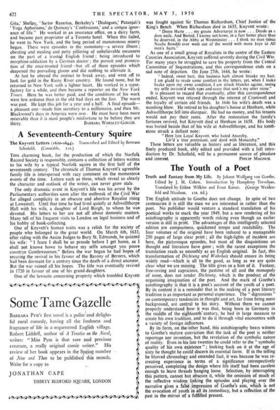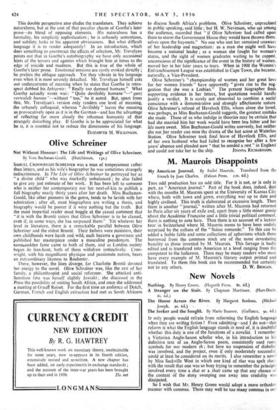The Youth of a Poet
THE English attitude to Goethe does not change. In spite of two centenaries it is still the man we are interested in rather than the poet. No publisher would venture a standard translation of his poetical works to mark the year 1949, but a new rendering of his autobiography is apparently worth risking even though an earlier version is still in print. The advantages of this intelligently selected edition are compactness, -quickened tempo and readability. The four volumes of the original have been reduced to a manageable 250 pages of large clear print ; all the high-lights of incident are here, the picturesque episodes, but most of the disquisitions on thought and literature have gone ; with the rarest exceptions the translation reads as smoothly as an English original. In fact, this transformation of Dichtung and Wahrheit should ensure its being widely read—which is all to the good, as long as we are quite clear what we are missing. The title gives us a hint of it. Fantasy, free-roving and capricious, the pastime of all and the monopoly of none, does not render Dichtung, which is the product of the organising imagination of the poet. And the mark of Goethe's autobiography is that it is a poet's account of the youth of a poet. By its content it is a reminder that in the making of a poet literary tradition is as important as personal experience. The " digressions " on contemporary tendencies in thought and art, far from being mere background, are central to his story. Without them we cannot properly understand how it was that, being born in Germany in the middle of the eiglateenthi century, he had in large measure to create his own tradition, and to do it through vital encounters with a variety of foreign influences. By its form, on the,)Other hand, this autobiography bears witness to Goethe's mature conviction that the task of the poet is neither reportage nor invention, but the revelation of the symbolic nature of reality. Even in his late twenties he could refer to the " symbolic quality of his own existence " ; looking back on it at the age of sixty he thought he could discern its essential form. If in the telling he blurred chronology and emended fact, it was because he was re- creating experience in terms of a significance retrospectively perceived, completing the design where life itself had been careless enough to leave threads hanging loose. Selection, by interrupting this pattern, cannot but obscure it, while the omission of much of the reflective wisdom •linking the episodes and playing over the narrative gives a false impression of Goethe's aim, which is not the evocation of youth in all its immediacy, but a reflection of the past in the mirror of a fulfilled present. This double perspective also eludes the translators. They achieve naturalness, but at the cost of that peculiar charm of Goethe's later prose—its blend of opposing elements. His naturalness has a formality, his simplicity sophistication ; he is urbanely sententious, and subtlety lurks in his apparent obviousness. But what difficult language it is to render adequately! In an introduction, which does something to counteract the effects of selection, Mr. Trevelyan points out that in Goethe's autobiography we have only occasional hints of the terrors and agonies which brought him at times to the edge of suicide and madness. But this is true of the whole of Goethe's later prose. Emotional tensions are rarely evoked directly ; he prefers the oblique approach. Yet they vibrate in his language even when it is most serenely detached. Mr. Trevelyan himself cuts out undercurrents of meaning when he states that Goethe in retro- spect dubbed his Iphigenie: "Really too damned humane." What Goethe actually wrote was : " Quite devilishly humane "—"ganz verteufelt human"—without " too," be it noted. But, apart from this, Mr. Trevelyan's version only renders one level of meaning, the urbanely colloquial, whereas " devilishly " leaves the meaning as provocatively open as it is in the German—and has the advantage of reflecting far more closely the inhuman humanity of that strangely disturbing play. If Goethe is to be appreciated for what he is, it is essential not to reduce the dimensions of his language.
ELIZABETH M. WILKINSON.







































 Previous page
Previous page